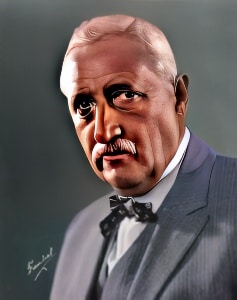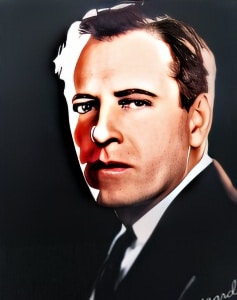 George Nichols (1864-1927) was an American actor and film director who made significant contributions to the early years of American cinema.
George Nichols (1864-1927) was an American actor and film director who made significant contributions to the early years of American cinema.
He was a versatile performer and a respected director, known for his work during the silent film era.
Born on November 4, 1864, in Rockford, Illinois, George Nichols began his career in theater before transitioning to the burgeoning film industry in the early 20th century. He quickly established himself as a talented character actor, appearing in a wide range of silent films, including comedies, dramas, and Westerns.
One of his notable early roles was in the 1914 silent film “Tillie’s Punctured Romance,” directed by Mack Sennett and starring silent film legends Charlie Chaplin and Mabel Normand. George Nichols played the role of Tillie’s father in this early feature-length comedy, which is often considered one of the first full-length comedy films.
As the film industry transitioned to sound in the late 1920s, many silent film actors faced challenges in adapting to the new medium. George Nichols, however, successfully made the leap to sound cinema, continuing his acting career in films with spoken dialogue.
One of his sound film appearances was in the 1929 film “The Case of Lena Smith,” a drama directed by Josef von Sternberg. Nichols played a supporting role in this early sound film, showcasing his adaptability as an actor in the changing landscape of the film industry.
George Nichols was not only known for his acting but also for his directing work. He directed a number of silent films, including “Dough and Dynamite” (1914), which starred Charlie Chaplin. Nichols’ experience as an actor likely contributed to his successful transition to directing.
While he may not be as widely recognized as some leading stars of his time, George Nichols’ contributions to the early years of American cinema are remembered as an important part of Hollywood’s history. His ability to adapt to changing technologies and his talent as both an actor and director marked him as an influential figure in the film industry during a transformative period.
George Nichols continued to work in films until his retirement from acting and directing. He passed away on September 20, 1927, marking the end of a career that played a crucial role in the early development of American cinema. His work remains a part of the rich history of the film industry, reflecting the collaborative and pioneering spirit of the early film era. Nichols’ legacy endures through his extensive filmography, contributing to the lasting appeal of early cinema.
Loading live eBay listings...




